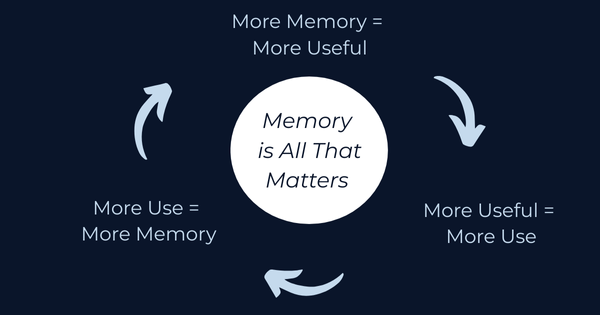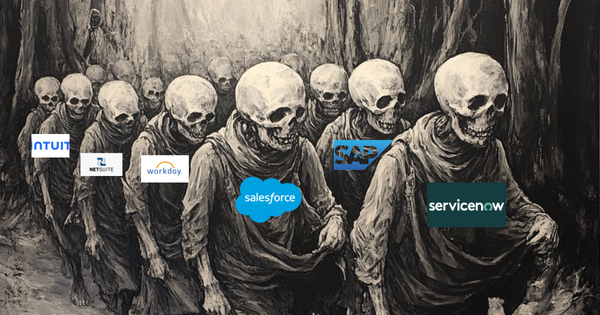The War For Our Digital Brains
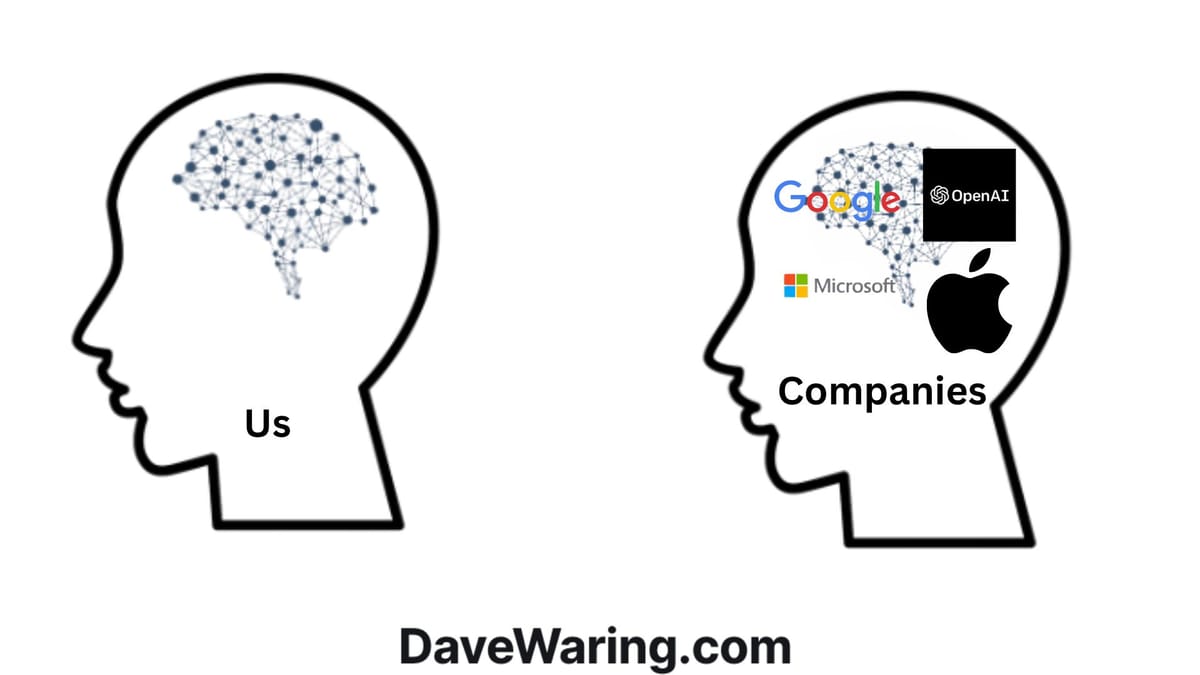
I’ve spent the last few months going deep into the land of AI.
I’ve learned about “Tokens” and “Context Windows”.
I’ve gone down the rabbit holes of “LLMs” (Large Language Models) and “RAG” (Retrieval Augmented Generation).
I’ve even toyed with “locally hosting” my own “open source” AI models using “Ollama”.
And After months of study...I felt dumber and more confused than ever.
But then something clicked…
A simple idea that cut through all the complexity.
And explains what’s happening in a way that anyone can understand:
Tools like OpenAI’s ChatGPT aren’t just AI tools…
They’re digital brains.
This simple idea tied everything else together for me…
And makes our AI driven future clear.
Human Brain:
Human brains are made up of 3 primary components:
- Storage/Memory
- Information Retrieval
- Intelligence
Digital Brain:
Digital brains like Open AI’s ChatGPT are made up of the same 3 components:
- Storage/Memory: Digital Brains like ChatGPT can store our information and remember what we tell them.
- Retrieval: We can use their chat interfaces to retrieve that information.
- Intelligence: And we can leverage their AI algorithms to provide us with intelligent insights on that information.
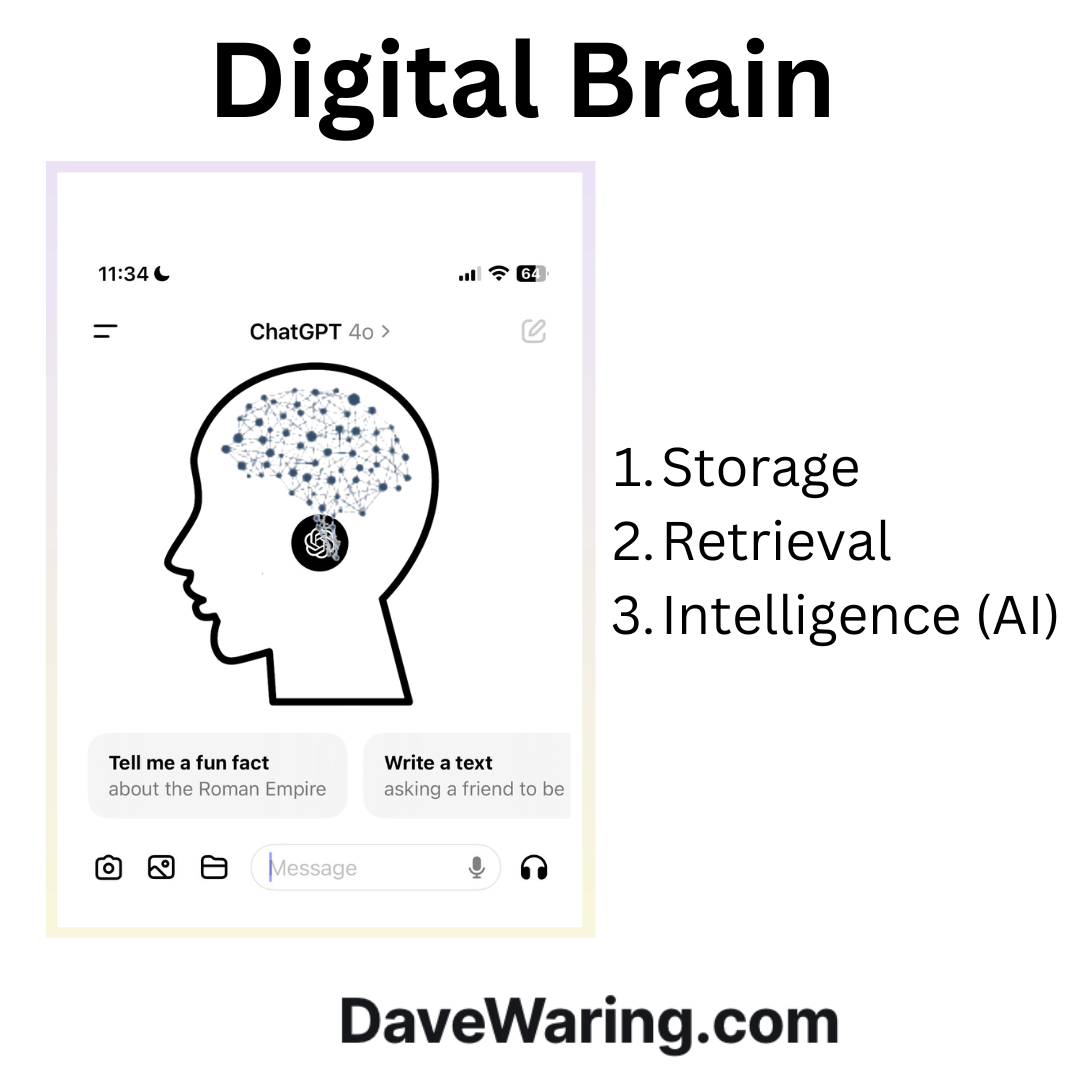
We’ve had digital storage and retrieval for decades.
We store our information in databases.
We use applications like those on our iPhones to retrieve it.
And we use the intelligence in our physical brains to leverage it.
That’s how it’s worked for decades.
But now we also have digital intelligence
Digital intelligence that can think like a human.
That can learn like a human.
And that we can talk to like a human.
In other words, we no longer have to work with dumb computers.
We can now talk to digital brains.
And we can not only interact with them by typing in a chat window.
They can see...
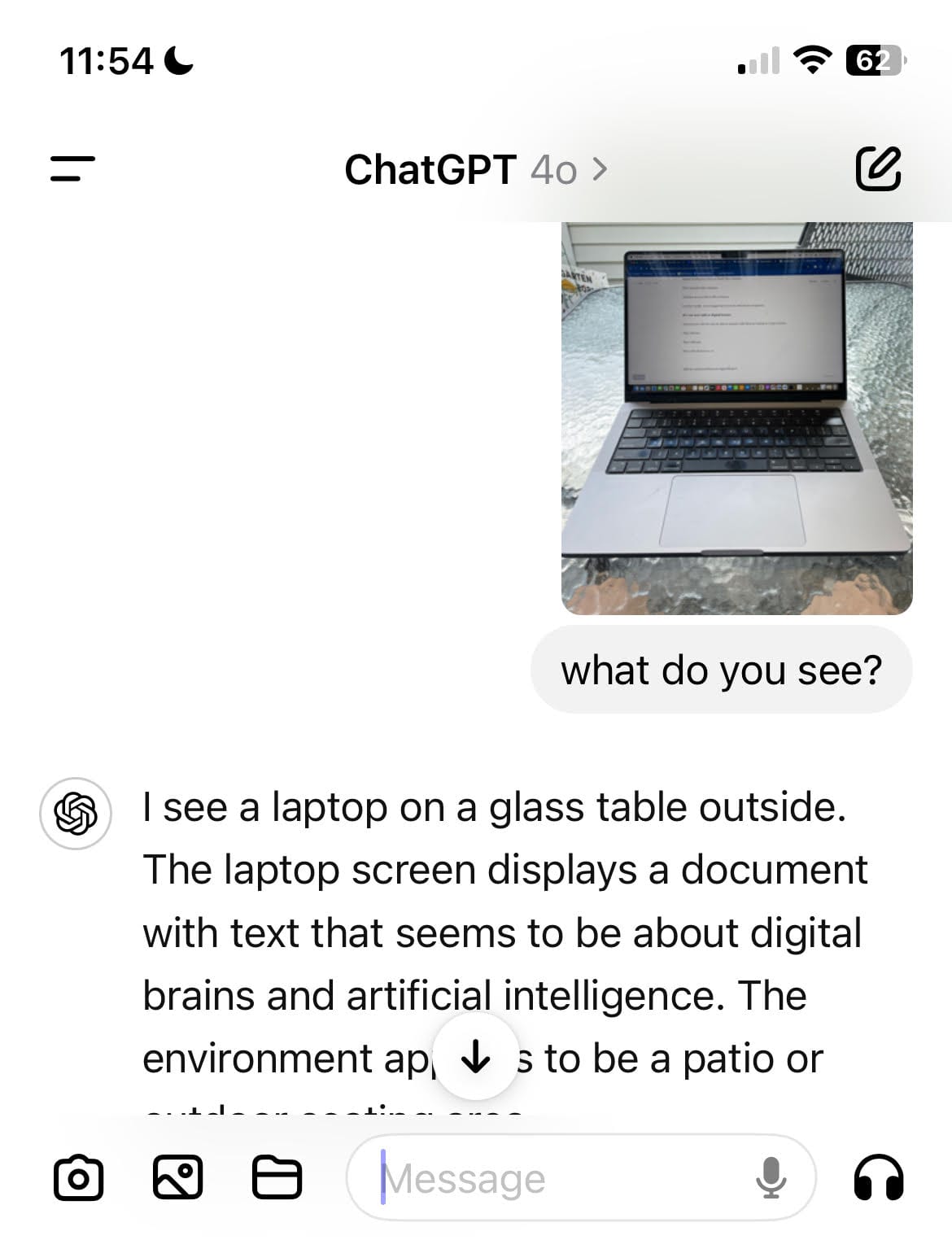
They can hear...
And they can talk back to us.
ChatGPT can hear and talk.
Still not convinced these are digital brains?
How about this…
We’re putting them into robot’s heads to make them intelligent too:
If that’s not a digital brain then what is?
So now what?
We no longer need to know all the technical mumbo jumbo to understand where this is headed.
We just need to understand that we’re dealing with digital brains.
And then we can simply ask:
What would you do with an extra brain?
A brain that:
- Is smart and constantly getting smarter
- Never sleeps
- Never gets tired of working for you
- Can multi-task dozens or even hundreds of projects for you at the same time
Or put more simply…
What are the things you do that could benefit from more intelligence?
The answer is everything.
We’re going to use digital brains for everything.
To find the answer to any question.
As our personal Dr., lawyer, trainer, nutritionist, therapist, and chauffeur.
As our live in cook and maid.
In companies.
In governments.
To do the things that we don’t want to do.
And to help us do the things that we do want to do better.
We’re going to feed digital brains all our information
The more information we give our physical brains the better they are.
And the more useful to us they become.
The same will be true of the digital brains we use.
We’ll give them all our health info and fitness tracker data so they can provide us with real time health advice.
We’ll give them all our personal finance data so they can make budget and investing recommendations.
We’ll tell them about all our relationships so they can help us improve.
We’ll give them all our work information so they can do that work for us.
And the list goes on and on.
We’ll feed them our data and knowledge automatically via our devices
We’ll feed them data and info from our phones…
Our computers…
They’ll be embedded in our smart watches…
Fitness Trackers…
Glasses…
Headphones…
Cars…
Toilets…
Washing Machines…
Anything that can have a chip that feeds our digital brains information will.
And this is not a guess.
It’s already happening.

But there’s some issues…
- We’re losing control of our digital data and knowledge
More and more of the data and knowledge we need to feed our digital brains is quickly becoming controlled not by us, but by the companies whose products and services we are using.
Sometimes it’s not possible for us to access this data at all.
And even when we can it’s often difficult to get it in a useful format.
- The digital data and information that will drive our digital brain is becoming more and more siloed.
My computer and iPhone are from Apple.
I use Google Drive for most of my work information.
I bought my fitness tracker from Garmin.
I got my headphones from Bose.
My sunglasses are Maui Jims.
And I drive a Toyota.
Many of these items already collect information that would be very useful to my digital brain.
And those that don’t soon will.
But good luck getting access to that information in a format where it can be used across these services, and not just within each one.
On the one hand that’s a good thing.
It prevents any one company from having too much control over my data and the future digital brains I’ll be using.
On the other hand it sucks…
Having my data and knowledge spread out across a bunch of companies will make my digital brains much less intelligent than they could be.
Like a personal assistant that only has access to a small slice of my information.
It would be so much better to have 1 all knowing assistant that has access to all my information…
One all knowing digital brain
A digital brain that unites all my knowledge and information in 1 place…
Just like my physical brain does.

Using One all knowing digital brain is where we are headed.
I know this because I wouldn’t want the information in my physical brain to be spread out and siloed in a bunch of different places.
So I don’t want my digital brain’s info siloed either, for all the same reasons.
And once you understand this, you understand that there is only 1 question that matters.
1 question that will determine where we land on the spectrum between utopia and dystopia.
And that question is:
Who will control your digital brain?
There are really only 2 options:
- A company will own and control your digital brain.
- You will own and control your digital brain.
Company owned and controlled digital brains currently have the lead.
And Google is the furthest ahead.
They’ve been working towards building a unified digital brain for years.
Google has the storage needed for everyone’s digital brain.
It’s called Google Cloud.
They have the retrieval engine.
It’s what Drives Google Search.
And Google also has the intelligence.
Many of the AI breakthroughs that allow digital brains to exist were invented at Google.

And Google already has all the products and services we need to feed our digital brains:
Alphabet, which is the parent company that owns Google Search, also owns the following companies and projects:
Google Search: Access all information on the internet in one place.
Youtube: 500 hours of video per minute uploaded and organized
Google Chrome: Most popular web browser. Also the name of their computer operating system that ChromeBooks are built off of.
Gmail: Your email.
Google Photos: Your photos and videos
Google Drive: All your work docs
FitBit: Watch, Health and fitness tracking
Pixel/Android Phones: Mobile phones and the most popular mobile phone operating system.
Waymo: Self driving cars.
Google Nest: Sensors for your home.
Glass: Augmented reality glasses
And this is just a small sample of what’s going to allow Google to provide us with an amazing digital brain.

And Google is not the only company fighting the war for our digital brains.
All Big Tech companies are joining the fight.
The profits generated from Digital Brains will be insane
That’s a big reason why the 5 most valuable companies in the United States are:
- Microsoft
- Apple
- NVIDIA
- Amazon
- Alphabet (Parent Company of Google)
Microsoft, Apple, Amazon, and Alphabet are all building the digital brains I am talking about.
And NVIDIA makes the computer chips that most of these digital brains run on.
Oh Shit
If you are not thinking “oh shit” right now, you should be.
Do you want Google or another Big Tech company to own your physical brain?
Then you don’t want them to own your digital brain either.
If most people use a Big Tech owned digital brain it will mean:
Less Truth:
Truth is reached through intelligent discourse among multiple parties.
If one company controls the intelligence, then they will decide what truth is…not us.
Less Individual Wealth
You likely make your living from the knowledge and experience you have accumulated in your physical brain.
If you give that knowledge and experience to a company owned digital brain, they will benefit from it instead of you.
This is why Big Tech companies are already worth Trillions.
We live in a knowledge economy…
And they currently control the digital knowledge.
Less Individual Freedom
Whoever controls your physical brain controls you.
The same will be true with your digital brain.
Less Individual Power
“Data is the new gold.”
The most powerful AI will be that which has access to the most data.
If we keep giving our “gold” to Big Tech companies they will continue to have the power…not us.
Less Individual Privacy
When using a Big Tech provided digital brain they control the sharing of our personal data…not us.
Currently companies control most of the digital brains we use.
OpenAI’s ChatGPT, Google’s Gemini, and Microsoft Co-Pilot are the most popular digital brains.
These digital brains are all company owned…
And hopefully you now understand why this is a problem.
If we continue down the path we are on now, a small group of companies will decide how our digital brains are allowed to think…
How they are allowed to act…
And will be the primary beneficiaries of the immense wealth that is about to be generated.
And we’ll be stuck with less truth, less freedom, less wealth, less power, and less privacy.
Wouldn’t it be better if we owned and controlled our digital brains instead of a company?
We should own, control, and benefit from our digital brains…just like we do our physical brains.
We don’t have to use the digital brains provided to us by Big Tech companies.
The technology to create, control, and benefit from our own digital brain exists today.
And for a relatively low cost.
Storage: Tools like Supabase can be used as digital brain storage.
Retrieval: Tools like LangChain can be used to build our digital brain’s retrieval logic, and connect it to our digital brain’s storage and external data sources.
Intelligence: The HuggingFace community develops and trains AI models and datasets anyone can own and use.
The above tools are all open source.
That means we don’t need a Big Tech company to build, own and control our digital brain…
We can do it ourselves.
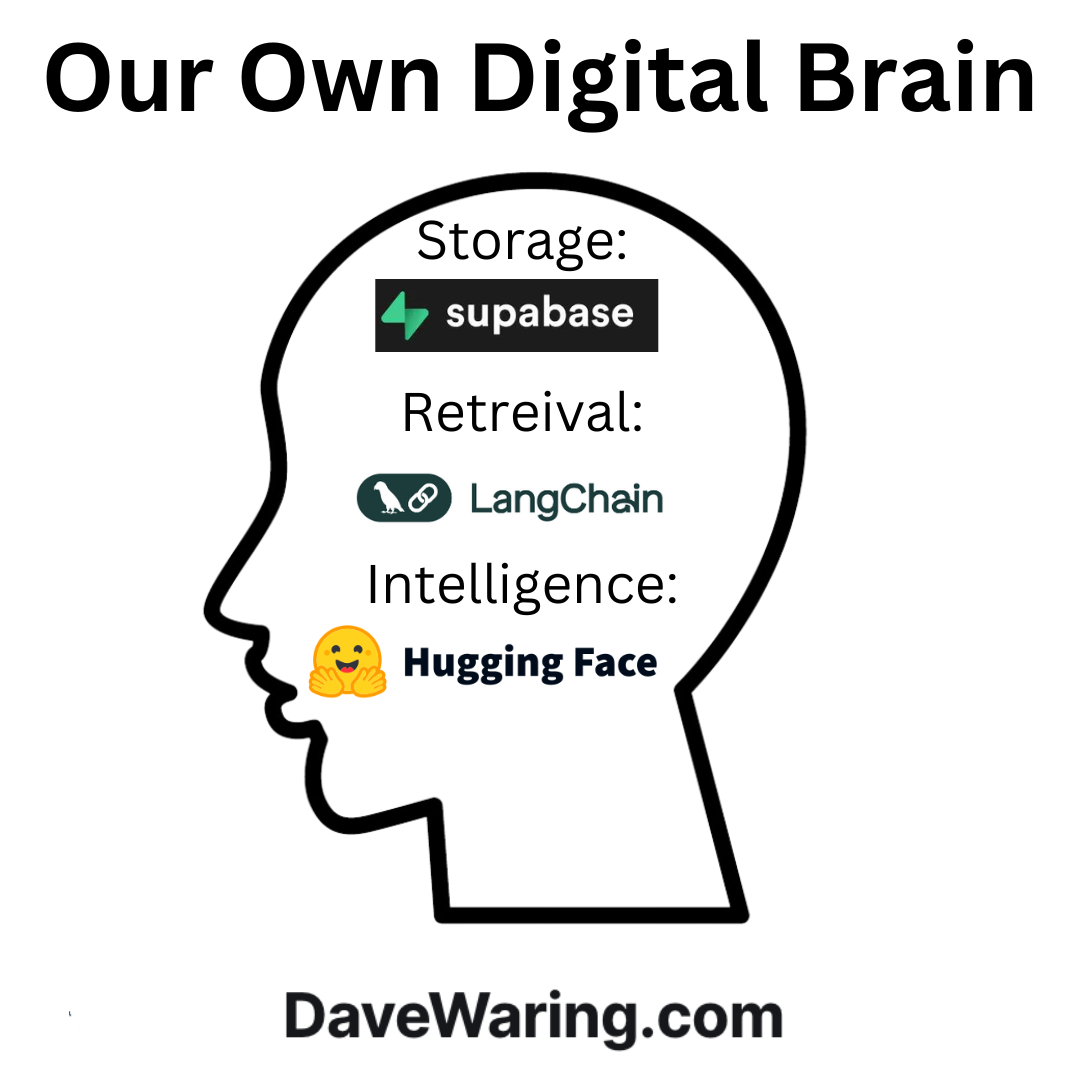
And we can use this technology to build a digital brain that is not only as good as the digital brains provided to us by Big Tech companies…
But better.
Winning the War for Our Digital Brains
Big tech digital brains have a lot of advantages, and a big head start.
But it is not Big Tech companies that currently control the most powerful weapon in the war for our digital brains.
That weapon still currently belongs to us.
What is that weapon?
Our personal data, knowledge, and information.
Our physical brains are nothing without the data, knowledge, and information we provide them to learn from.
And the same is true for digital brains.
To give you the best health and nutrition advice, a digital brain needs access to your health and nutrition data.
To give you budgeting and investment recommendations it needs access to your personal finances.
To help you with your work it needs access to your emails, chats, and other work documents.
You get the idea.
To win the war for our digital brains we just have to stop giving our data, knowledge, and information to Big Tech.
And start keeping it for ourselves.
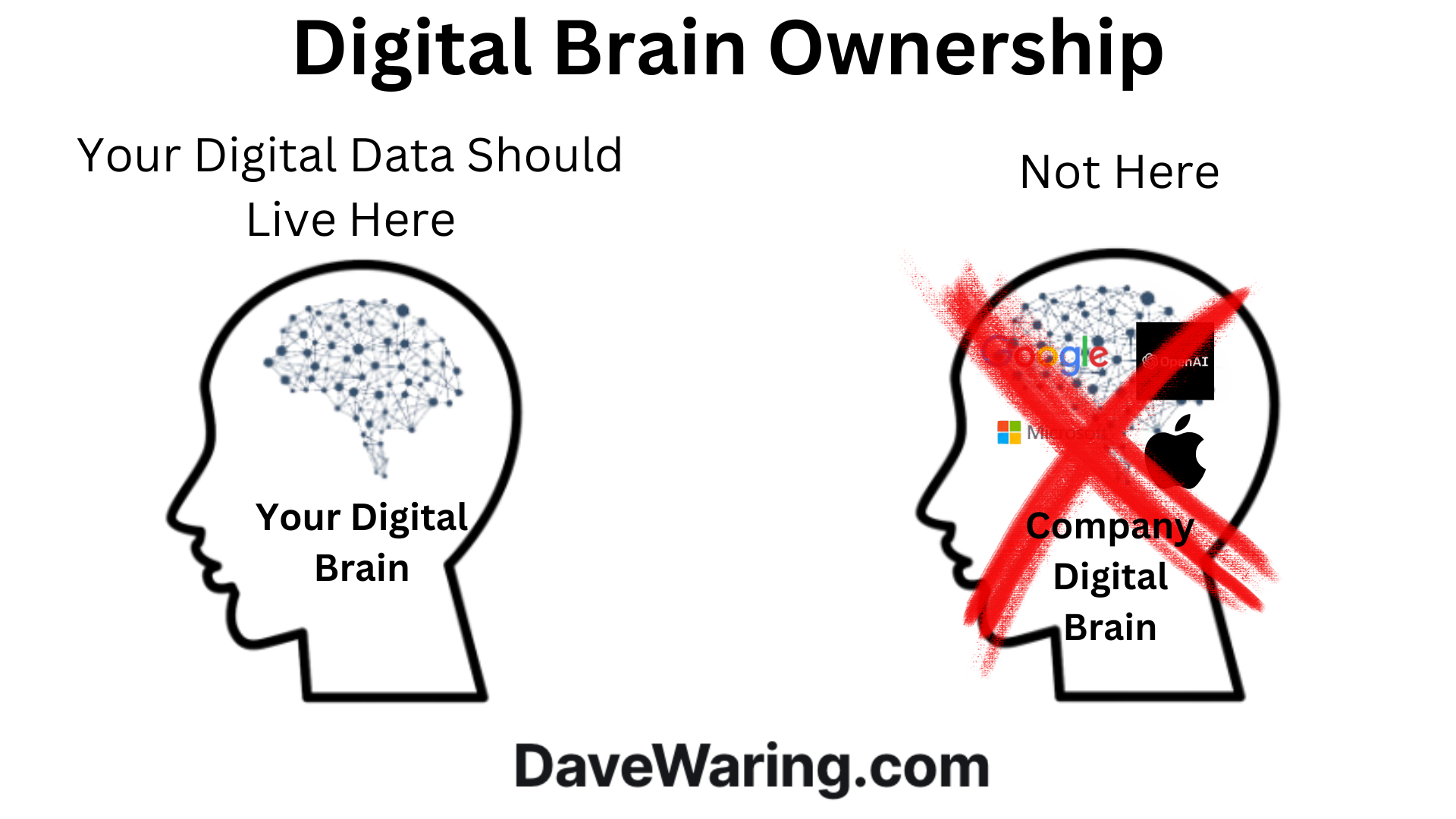
And if we do that we will be able to build a digital brain that we own, control, and benefit from…
A digital brain that is not only as good as the ones offered by Big Tech companies
But way better.
Big Tech’s Achilles heel is already exposed.
And they know it.
Big Tech Digital Brains are running out of data, knowledge, and information to learn from:
Here’s the Wall Street Journal telling us what Big Tech already knows:
“companies have already trained their AIs on more or less the entire internet, and are running out of additional data to hoover up. There aren’t 10 more internets’ worth of human-generated content for today’s AIs to inhale.”
And it’s not just that Big Tech Digital Brains are running out of data, knowledge and information to learn from…
It’s also that their digital brains are all trained on the same internet.
This is why the differences between the digital brains offered by Big Tech companies are currently relatively minor.
And why the digital brain that has access to data, knowledge, and information that no other digital brain has access to will win the war for our digital brains.
And much of that data, knowledge, and information is currently controlled not by Big Tech…
But by us.
We just have to stop giving it to Big Tech, and start keeping it for ourselves.
And this is how we’ll do it…
How to Win the War for our Digital Brains in 8 Steps
Step 1: Start calling them Digital Brains.
The average person is either not following AI advancements at all...
Or is completely overwhelmed with information.
And that’s not because they are dumb.
It’s because all of this is so new…
And it’s changing so fast.
If we want non developers to understand what’s happening we need a simple way to explain it…
A vocabulary that people already know and are familiar with.
Everyone gets what a physical brain is.
And everyone can understand that AI just allows us to have digital versions of a physical brain…
With some super powers.
Step 2: Provide a Simple Alternative to Big Tech Digital Brains
If we want everyone to be able to create, control, and benefit from their own digital brain we need:
- Alternatives to Big Tech digital brains that allow us to maintain ownership and control over our digital brain.
- Alternatives that are as easy to setup and use as going to chat.openai.com and starting to type. (And hopefully even easier)
One or the other is not enough.
To win we need both.
Those with technical abilities can already create, control, and benefit from their own digital brains…
And are already doing so.
But existing options are currently way too complicated for the average person to use.
If the average digital brain owner has to open a “command line” and do anything, we might as well give up.
I’ve worked around technology my entire career and didn’t even know what a command line was until I started this process.
Step 3: Start with a narrow and deep use case that is widely applicable.
Big Tech digital brains are starting by trying to be all things to all people.
Their size and ability to fight the war for our digital brains across every topic and use case is their greatest strength.
But it is also their greatest weakness.
In trying to be good at everything…
They sacrifice the ability to be the best at each specific use case.
Big Tech’s Digital Brain “army” is huge, but it’s distributed broadly.
If we want to win the war for our digital brains we must start not with fighting Big Tech widely and broadly…
But with fighting narrowly and specifically.
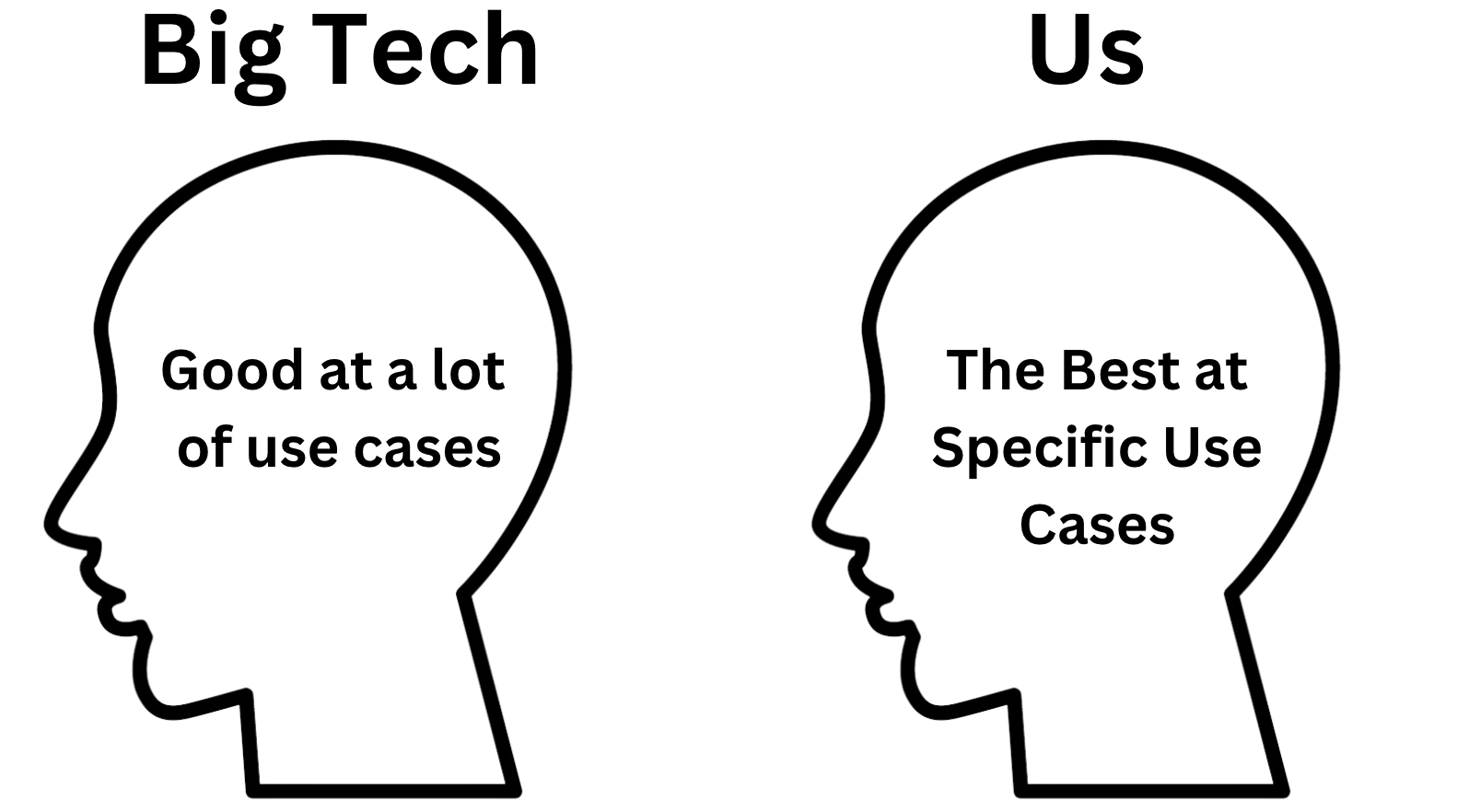
Instead of trying to be good at everything, we should start by being the best at 1 thing.
And that 1 thing needs to be applicable to a wide variety of individuals.
The best digital brain for 1 thing that many individuals care about.
This will make our digital brain immediately useful for its owners.
It will make it easier to use than the blank canvases provided by Big Tech Digital Brains.
And it will start to gather valuable personal data, information and knowledge around this use case in our own digital brain…
Instead of Big Tech’s.
So what do we all care about?
Our Health
Our Personal Finances
Our Relationships
Our Work
Our Entertainment
The initial use case therefore should be chosen from one of these areas.
Step 4: Standardize Digital Brain Use Case Development
To win we need to expand rapidly from our initial use case.
To become the best at more and more use cases…
And to do so faster and faster each time.
This means we need a set of standards for how we go about building new use cases.
Standards that are informed by our learnings from adding each prior use case.
Standards that will make it easier and faster each time we add a new use case.
Standards that make it easy to feed data from our existing hardware devices to our digital brains.
Standards that make it easy to build hardware that feeds our digital brains automatically.
Launching the first successful use case will be hard.
We need to decide what existing code bases we want to use as components.
We need to decide what code we need to write ourselves.
And we need to build the digital brain in a manner that makes it easy for anyone, regardless of technical ability to create, control, and benefit from their own digital brain.
Standards will make it fast and easy to add new use cases..
And to rapidly deploy our digital brain owner “army” to win more and more digital brain use case battles against big tech.
Step 5: Add more use cases
Big Tech digital brains are trying to win the war for our digital brains all at once.
They are attacking all possible use cases from the top down…
To win we need to attack from the bottom up…
Our physical brains aren’t good at learning everything at once.
It’s better for us to learn and see the benefits of our digital brain one use case at a time.
It will allow us to refine our digital brains to be the best at each specific use case
And most importantly…
It will ensure that we are providing more and more of our personal data, knowledge, and information to a digital brain that we own and control.
Instead of Big Tech.
This is the first weapon we will deploy in the war for our digital brains.
With each additional use case, we will be providing more and more of our personal data, knowledge, and information to a digital brain that WE own.
And starving Big Tech digital brains of that same information.
The more we use our own digital brains the smarter and smarter they will become.
And the dumber and dumber Big Tech digital brains will be in comparison.
Step 6: Make it easy for anyone to build additional use cases
Once we have our digital brain development standards in place…
And our first successful use cases…
It’s time to put our digital brain building on steroids.
We do this by making it easy for anyone to build new use cases for their digital brains.
Want your digital brain to keep track of your calendar and provide advice on how you can optimize your time?
Want it to give it your diary and have it provide advice on how to improve relationships?
Or maybe you want it to analyze stocks based on a specific set of criteria you have developed…
Or even have your digital brain help you develop the criteria too.
You can add all these use cases to your digital brain and more.
Just by chatting with your digital brain and telling it what you want to add.
No technical ability required.
This is the second weapon we will deploy in the war for our digital brains:
It’s where we take the learnings from our initial use cases and provide them to everyone.
We don’t have to hire our own “army” to fight Big Tech…
Every digital brain owner will automatically be part of our army..
And help us move from fighting Big Tech one use case battle at a time, to fighting across all use cases…
All at once.
Step 7: Enable Digital Brain Owners to Trade their Data, Knowledge, Information and Use Cases
We are constantly receiving and sharing data, knowledge and information to and from our physical brains.
And there is no reason this shouldn’t be true for our digital brains as well.
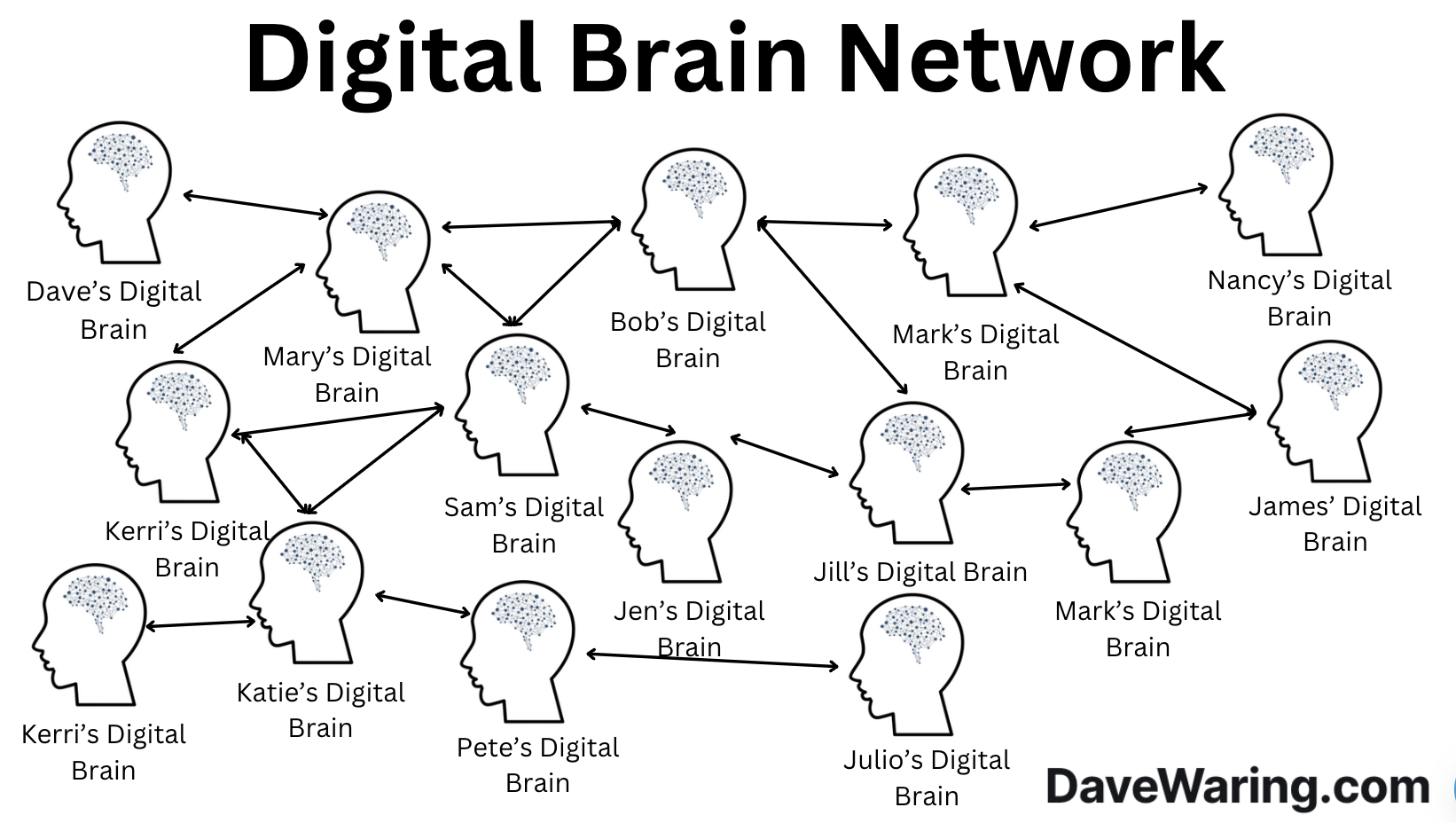
In fact our digital data, knowledge, and information is already being traded.
It’s just being traded mostly by Big Tech companies…
Instead of us.
Let’s say you’re using your digital brain to make investments.
You might be interested in connecting with other digital brain owners who are doing the same…
Comparing notes…
And potentially sharing data, knowledge and information to help the group get better at investing.
Just like an investment club where people get together and share ideas from their physical brains.
Only this time it’s sharing from your digital brain.
This is the 3rd weapon we will deploy in the war for our digital brains.
Once our digital brains have our personal data, knowledge and information we remove the ability for Big Tech to benefit from it…
And we give that benefit to ourselves.
This allows us to connect with other digital brain owners to improve everyone’s digital brains, and deprives that ability from Big Tech.
Step 8: Enable Digital Brain Owners to Monetize Their Digital Brains
Most of us make our livings from the knowledge and experience we have accumulated in our physical brains.
And the same will be true for digital brains.
So the question is not if digital brains will make money.
It’s who will make the money?
The answer is whoever owns the digital brains.
If we own our digital brains we will make the money.
And if Big Tech owns the digital brains they will make the money.
It’s that simple.
Because the data, knowledge and information is digital, it’s also trackable.
This means we can see what’s happening with the data, knowledge, and information we are trading with other digital brain owners…
We can set the rules around what can be done with our data, knowledge, and information…
We can enforce those rules automatically…
And we can decide to put a price on our data, knowledge and information that we want to be paid when it is traded.
Take an investment advisor for example.
Right now people pay an investment advisor to help them with their investments.
As the investment advisor feeds more and more of their data, knowledge, and information to their digital brain, the better and better it will become at investment advising.
It doesn’t matter whether it’s coming from the advisor’s physical brain or digital brain.
As long as the advice is good, people will continue to pay for it.
And the investment advisor can use their digital brain to go from servicing dozens of clients, to serving anyone that has a digital brain.
Automatically.
This is where we go from winning one battle at a time, to winning the war for our digital brains.
Once individuals can make money by owning and controlling their digital brains, who is going to want to use a Big Tech digital brain instead?
The answer is no one.
The knowledge economy will be taken from the Big Tech platforms that currently control it, (and receive way more of the value than they are providing)…
And given to the digital brains that we own and control instead.
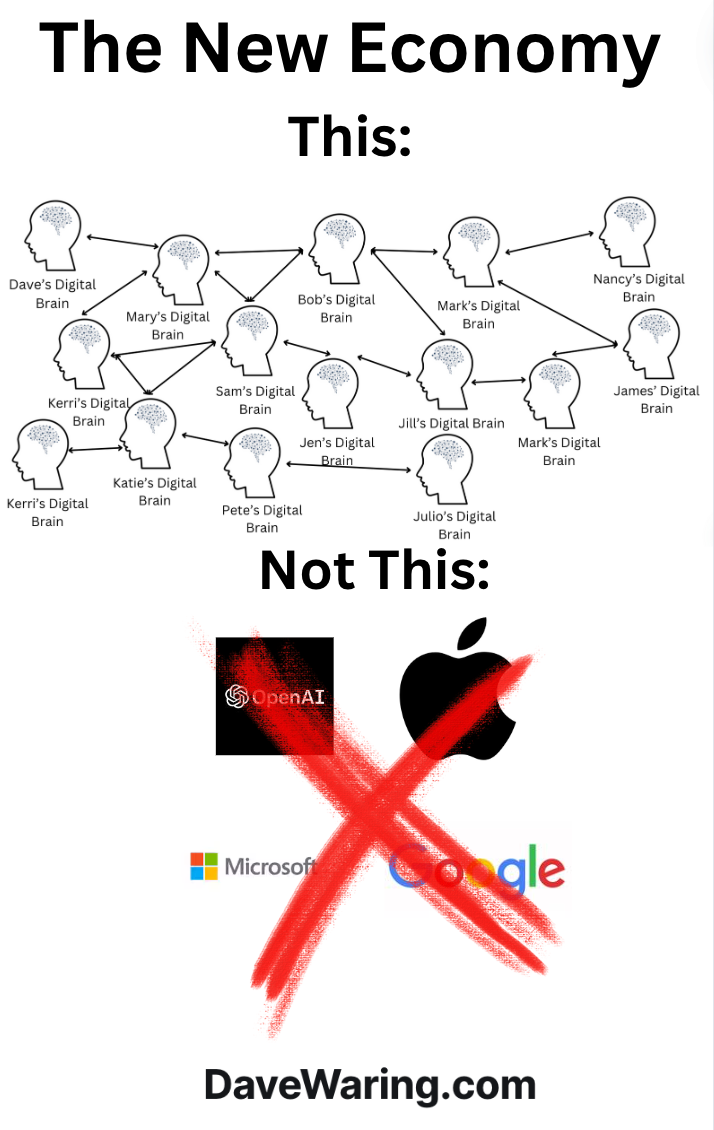
This new digital brain driven economy will not only generate massive wealth…
But that wealth will flow to those that are actually creating the knowledge that drives that knowledge economy.
Which is us.
Executing the above digital brain battle plan is possible today.
But we must not delay.
Big Tech already has a significant amount of our personal data, knowledge, and information.
And they are coming for all of it.
To win the war we must stop feeding our personal data knowledge, and information to Big Tech digital brains.
And start feeding it to our own.
I’m joining the battle
Today I move from just writing about digital brains, to creating my own.
I’m calling it Digital Brain Base.
Digital Brain Base is:
- A code base for building digital brains.
- A community for people who want to create, control, and benefit from their own digital brain.
The Digital Brain Base code will be freely copyable.
Once someone copies the code, they own it.
No one will have the ability to control that code base once it is copied, except the person that owns it.
And that includes me.
The Digital Brain Base community will live at DigitalBrainBase.com.
It is open to anyone who would like to contribute to winning the war for our digital brains.
I’ll also be blogging about my progress at DaveWaring.com.
You can follow along by joining my free email list here.
I hope you will join me in our battle to win the war for our digital brains.
I look forward to connecting with other like minded individuals.
And hope to see you in the DigitalBrainBase.com community soon.
Thanks for reading.
Dave



